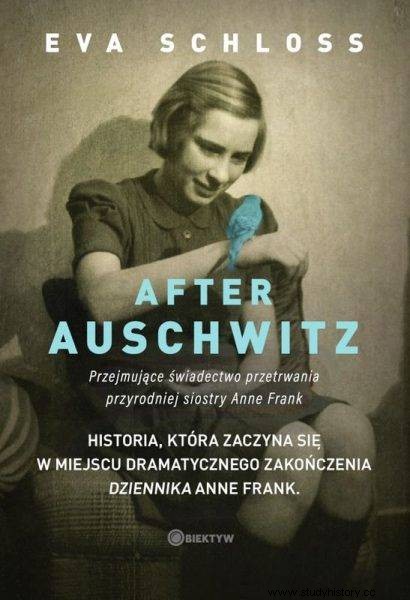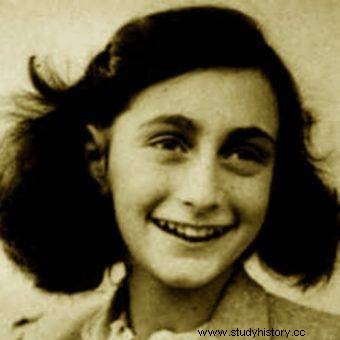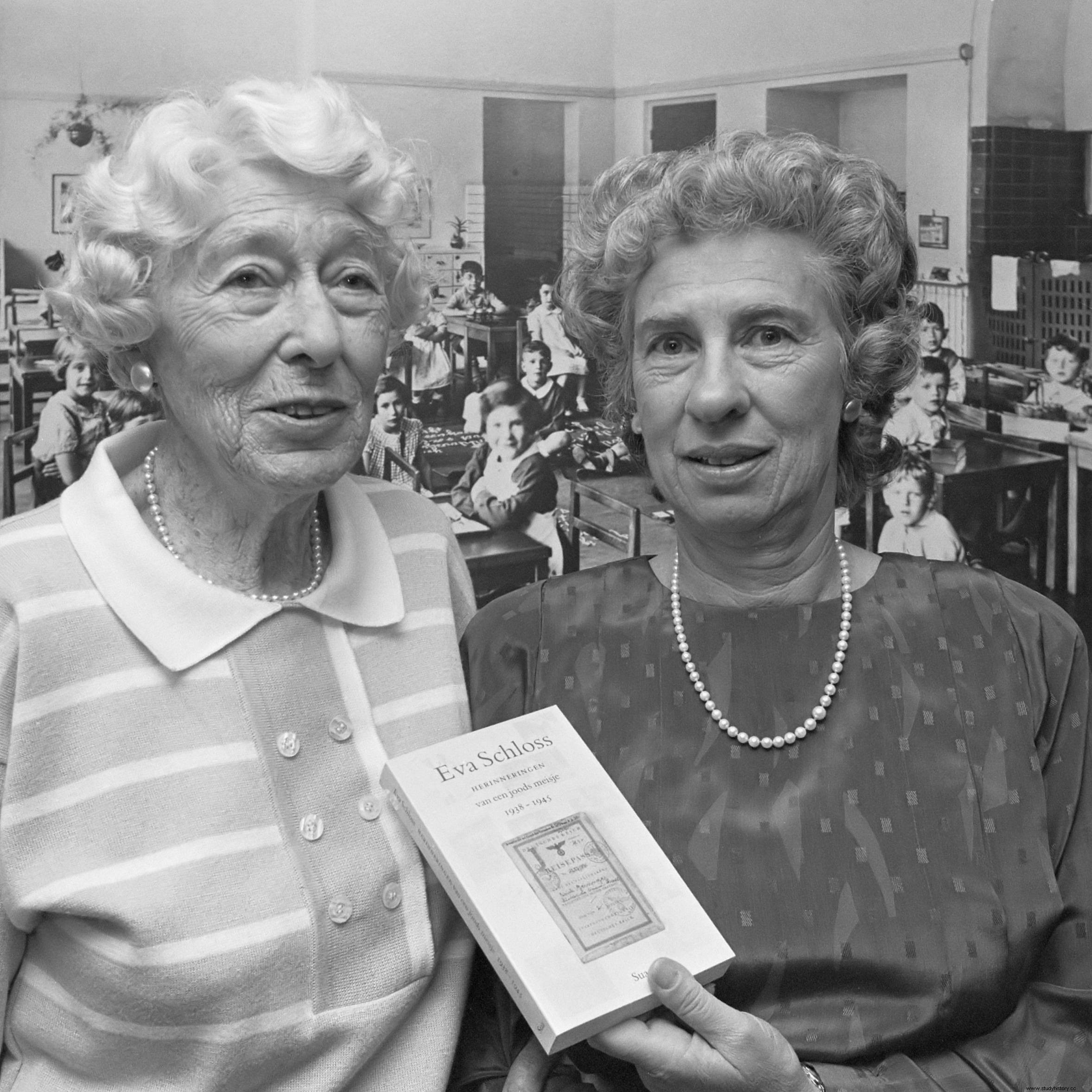They were practically peers. They both experienced the same ordeal:the struggle to survive, hiding in dramatic conditions from the Nazis, denunciation and imprisonment in Auschwitz. One thing was different. Unlike Anne Frank, her half-sister Eva lived to tell her story personally. And add its continuation.
Eva Geiringer (now Schloss) knew Anne Frank from the backyard of the Merwedeplein estate in Amsterdam. Years later, she described that the future author of the famous daily newspaper:"she wandered through film magazines and walked in the company of" dogs "to a cafe, where they enjoyed the taste of ice cream desserts and talked like real ladies from high society.
The girl did not even imagine how perversely her fate would intertwine with the life of her friend. It all started with the war.
Demons of memories
Otto Frank, Anne's father, hid for two years with his wife and daughters in a secret room in the office of the factory where he once worked. In August 1944, a cruel fate reminded them of them - their Dutch informer issued them. They were arrested by the Gestapo and sent to Auschwitz. Only Otto survived.
The life of Fritzi Geiringer, Eva's mother, was similar. First, she hid with her family. Later, she lost her husband and son in the camp. She herself managed to survive this hell on earth. She also saved her daughter. After the war, she met her former neighbor back in Amsterdam. The traumatic experiences connected them so much that they decided to marry. Evie was given the opportunity to live the life that the Nazis took from Anne Frank.

The text is based on the book by Eva Schloss and Karen Bartlett “After Auschwitz. A moving testimony of the survival of her half-sister Anne Frank ", which has just been released by Wydawnictwo M.
However, building a new life after the horrors of war and a concentration camp was not easy. For forty years Eva has not been able to talk about her childhood experiences. As she used to say, "this past cannot belong to the past." When they asked her grandchildren about the numbers tattooed on her forearm, she explained that it was ... a telephone number.
Only at the age of 60, forced by circumstances, decided to face the demons of memories. Her story - although it has a happy ending - gives shivers down the spine.
First steps in the wild
According to Eva's account, "the rest of her life" began on January 19, 1945. When she opened her eyes that cold morning and looked around the hut, no one was around - no guards, no dogs, no doctors. The Germans fled. As she described:
Although the term "skin and bones" would best describe our condition, we immediately mobilized to survive before the Soviet military arrives. How uplifting and comforting it was to know that the Germans had fled - and how I dreamed that this moment would come - but we had no illusions that it was the end of serious problems and now it would be a slope.
The challenges that awaited the surviving women were as if taken out of the macabre horror. First of all, they had to remove the bodies of fellow prisoners from the barracks, who died at night. " Removing the stiff bodies of women who were so close to me the night before, I can confidently consider the worst thing that I have been undertaking to this day, ”Eva recalled.
Although they managed to find food and warm clothes gathered by the Germans relatively quickly, the problem was the lack of water. One of the bombing raids damaged the water supply network in the camp. There was also no electricity. In order not to die of thirst, the embedded ones melted snow. Later they cut ice from the frozen lake at the gate.
Finally, on January 27, 1945, the Russians came.
Difficult to come home
"Mum and me were lucky that we could soon leave Auschwitz - most of my friends did not experience it," said Eva. Among the victims of the Holocaust were her best friend, Janny Koord, the boy who once gave her flowers and wanted to be her first sweetheart, Herman de Levie, as well as Anne and Margot Frank.
Only a handful of people Eva had known before survived the war. Most of them have changed beyond recognition. Eve summed it up best with the words:
We survived the ideology of ethnic cleansing (…). The Nazis chased our family from one end of Europe to the other, all in the name of their maddened obsession and insistence not to finish until the last representative of the Jewish nation is gone from the face of the earth.
I was still alive but still had a long way of learning to live again and finding my place in a world that often refused to hear about the scary things I used to be witness.
Returning to Amsterdam proved problematic. When Fritzi Geiringer went to enroll herself and her daughter on the list of people willing to go to the Netherlands, a Dutch Jew told her:“You are not Dutch, you are Austrian. And without you, we are fed up with the local Jewish population ”. Even after the war, prejudices did not disappear.

Anne Frank, one of the most famous victims of the Nazi extermination machine. Cover photo of the Polish edition of her "Diary"
Eventually, however - by rail and ship - the women arrived. Their Dutch apartment was - surprisingly - intact. Eva recounted:"The period of the next few weeks allowed us to enjoy what could actually be considered normal - even though nothing really was as it used to be."
Find out more:How to hide from the Germans? Moving stories of Jews fighting for survival
Learning to live anew
To earn a living, Eva's mother took a job as a secretary at a tie factory. The girl also made extra money by painting wooden brooches. Gradually, they managed to cope better, although the information about the deaths of their father and brother cast a shadow on their daily lives.
Eva had not accepted this fact for years. Every time she heard a car stop in front of the house, she assumed Dad and Heinz would come out. In the end, she had to come to terms with the tragic truth. Life went on. There were also trials of people responsible for the Holocaust, although - according to many, also Eva - no justice was administered during them.

Eva Schloss with her mother in 1989
However, time heals even the worst wounds. Eve's life was back on track - she met the boy, fell in love with reciprocity and got married. Young people wanted to start a family, but it turned out to be not that easy. The woman said:" The trauma of Auschwitz completely disrupted my hormonal balance and my body did not function properly. Hormone therapy was started and all I could do was wait - waited and waited while the baby was still gone.
Finally her dream came true. She has three daughters. She seemed to have forgotten the past. However, she decided to recall herself in the form of ... an exhibition about the life of Anne Frank organized in 1985 by the Amsterdam Anne Frank House Foundation. Eve had to face a childhood nightmare:
The decision to break the silence for years undoubtedly changed my life and gave me so much freedom that I went on a journey in search of my true nature long stolen from me (...).
Recovering balance after a traumatic experience and loss is such a slow and gradual phenomenon that during this process it is difficult for us to notice that it is at a snail's pace, but we come back to normality.
Source:
The text is based on the book by Eva Schloss and Karen Bartlett “After Auschwitz. A moving testimony of the survival of her half-sister Anne Frank ", which has just been released by Wydawnictwo M.
